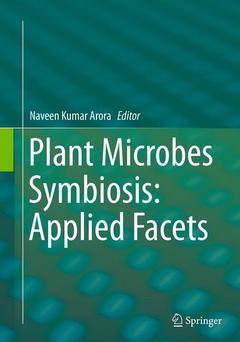Plant Microbes Symbiosis: Applied Facets, Softcover reprint of the original 1st ed. 2015 Applied Facets
Coordonnateur : Arora Naveen Kumar

Plants form mutualistic association with various microorganisms, particularly in the rhizosphere region. The association benefits both the partners in a number of ways. A single plant can support the growth of diverse microbes and in reciprocation these microbes help the plant in several ways. A great deal of knowledge is now available on the mechanisms of action of plant growth promoting microbes in forming association with their partner plant and benefitting it. With ever increasing population and to achieve food security it has become utmost necessary to utilize these friendly microbes to enhance the crop yield and quality in an ecofriendly and sustainable manner. We already know about the huge negative impact of chemicals used in agriculture on the humans and the ecosystems as whole. ?Plant Microbes Symbiosis ? Applied Facets? provides a comprehensive knowledge on practical, functional and purposeful utility of plant-microbe interactions. The book reviews the utilization of beneficial microbes for crop yield enhancement and protection against diseases caused by phytopathogens and nutrient deficiencies. The tome also reviews the utility of plant growth promoting microbes in helping the plants to deal with abiotic stresses imposed by climate change and anthropogenic activities. The book showcases how plant-microbe interactions are or can be utilized for reclamation of stressed soils and degradation of pollutants in a most effective and environment friendly manner. It also ascertains the reasons for the below par performance of the microbial based inoculants. The utilization of biotechnological tools for development of next generation bioformulations to combat the new challenges and overcome past hurdles has been discussed. This wonderful association between plants and microbes if used properly will not only enhance the crop yields and reclaim barren lands but also make our planet a better place to live on for all of its habitants.
1.Rhizosphere Bacteria for Crop Production and Improvement of Stress Tolerance: Mechanisms of Action, Applications and Future Prospects.- 2. Biopesticides: Where we stand?.- 3. Biotrophic Plant-Microbe Interactions for Land Reclamation and Sustainable Agriculture Development.- 4. Plant-Microbe Partnerships for Enhanced Biodegradation of Polychlorinated Biphenyls.- 5. Harnessing Plant-Microbe Interactions for Enhanced Protection Against Phytopathogens.- 6. Rhizospheric Plant Microbe Interactions: Key Factors to Soil Fertility and Plant Nutrition.- 7. Plant-Endophyte Interaction and its Unrelenting Contribution towards Plant Health.- 8. Abiotic and Biotic Plant Stress Tolerant and Beneficial Secondary Metabolites Produced by Endophytic Bacillus Species.- 9. Antifungal Compounds from Pseudomonads and Study of their Molecular Features for Disease Suppression Against Soil Borne Pathogens.- 10. Pseudomonad's- Plant Growth Promotion and beyond.- 11. Perspectives of Rhizobial Inoculation for Sustainable Crop Production.- 12. Legume- Rhizobia Symbiosis under Stress.- 13. Legume Root Exudates: Their Role in Symbiotic Interactions.- 14. Actinorhizal and Rhizobial-Legume Symbiosis for Alleviation of Abiotic Stresses.- 15. Azospirillum- A Bio-fertilizer for every Crop.- 16. Ectomycorrhizal Fungi and their Applications.- 17. Increasing the Role of Mycorrhizal Symbiosis in Plant-Plant Facilitation Process to Improve the Productivity and Sustainability of Mediterranean Agrosystems.- 18. Role of Plant Growth Promoting Rhizobacteria and their Formulation in Biocontrol of Plant Diseases.- 19. Effects of Soil Environment on Field Efficacy of Microbial Inoculants.
Emphasizes on the applied aspects of plant-microbe interactions
Defines how plant-microbe interactions can be exploited for the sustainable development of agro-ecosystems
Describes how future formulations be designed and developed Elaborates how we can exploit plant-microbe interactions to reclaim waste lands and combat biotic and abiotic stresses Contains renowned contributors from around the globe
Includes supplementary material: sn.pub/extras
Date de parution : 09-2016
Ouvrage de 381 p.
17.8x25.4 cm
Disponible chez l'éditeur (délai d'approvisionnement : 15 jours).
Prix indicatif 158,24 €
Ajouter au panierDate de parution : 11-2014
Ouvrage de 381 p.
17.8x25.4 cm
Disponible chez l'éditeur (délai d'approvisionnement : 15 jours).
Prix indicatif 158,24 €
Ajouter au panierThèmes de Plant Microbes Symbiosis: Applied Facets :
Mots-clés :
Bioformulation; Biological control; Biopesticide; PGPR; Rhizosphere
